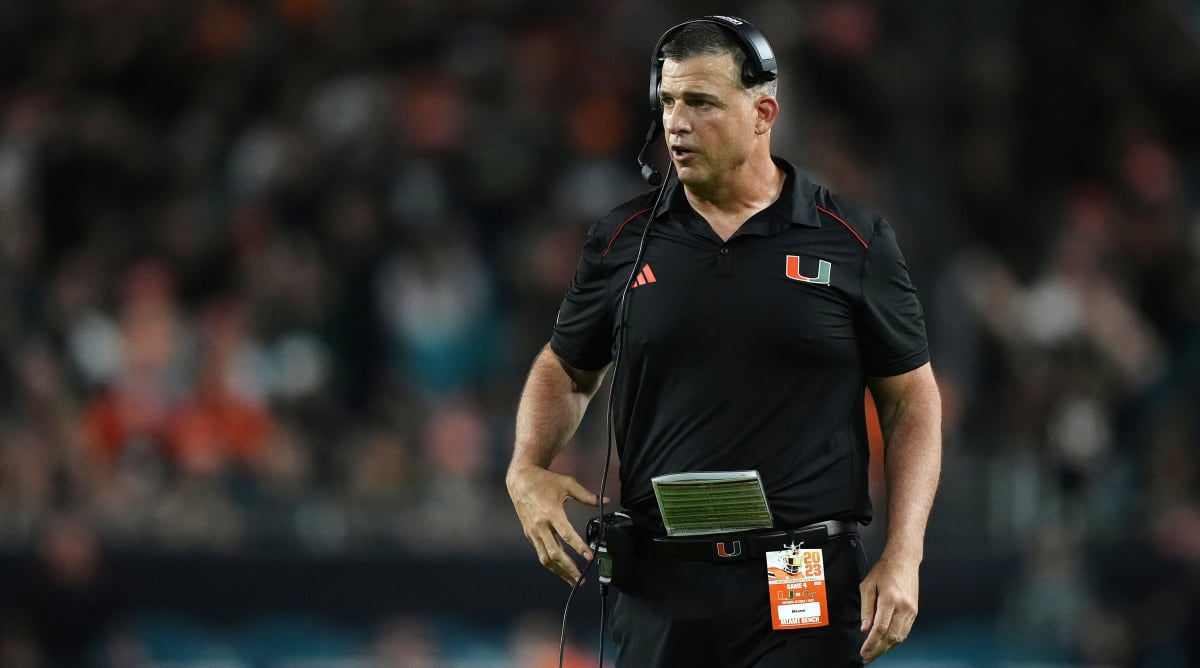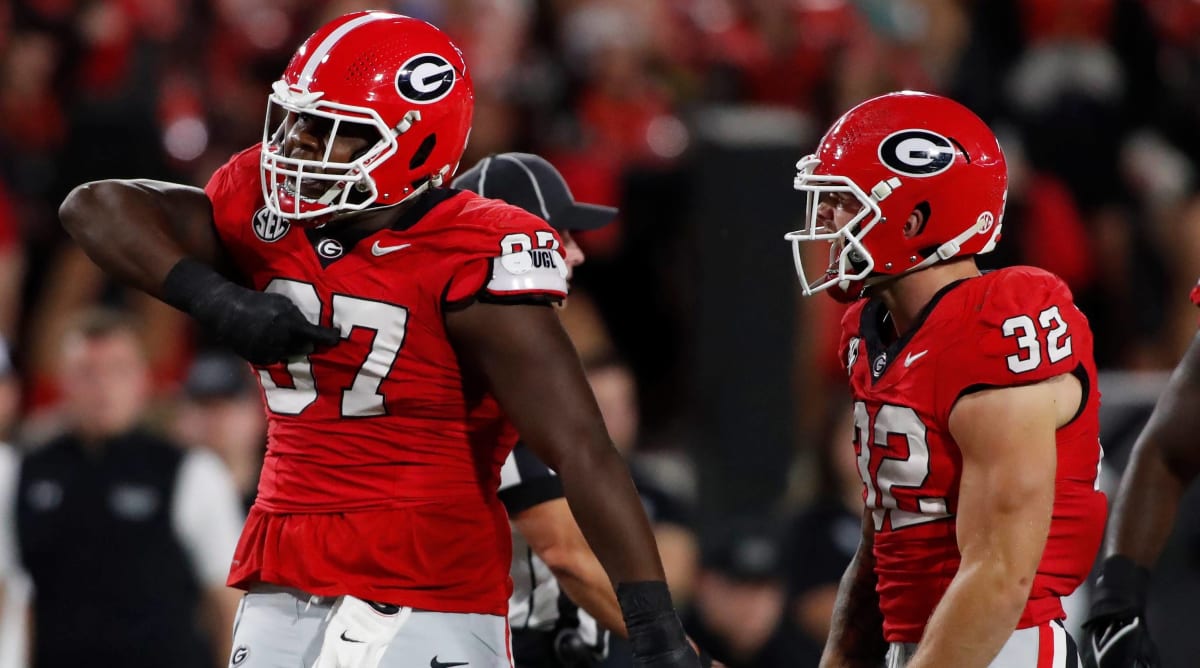Forty names, games, teams and minutiae making news in college football, where math continues to be a vexing problem:
First Quarter: All that money, all that staff, all those analytics … How are coaches still flunking close-game logic?
Mario Cristobal (1)—yeah, you knew we were starting with him—is being paid $8 million to coach Miami this season. The football staff directory on the athletic website lists 70 people below Cristobal’s name. There are the usual 10 full-time assistants, plus 16 analysts and four grad assistants. There are three analysts for special teams alone. There is a general manager of football operations, an executive director of football, an executive director of football recruiting, a senior football advisor, several directors of player personnel, a vast recruiting operations staff—on and on it goes.

Jasen Vinlove/USA TODAY Sports
Miami has invested lavishly in this small army to do one thing: win games. While it’s very hard to win them all, the hope certainly is to avoid giving away games through sheer incompetence. Which is what the $8 million man and his vast support network did Saturday night.
You’ve probably heard by now. The Hurricanes committed the ultimate crime against football in blowing a sure victory against Georgia Tech, refusing to take a knee to run out the clock when the easiest play was the only thing that was required. They called a running play, the back fumbled, Tech recovered, Tech completed passes of 30 and 44 yards against blindingly bad defense, Tech scored the winning touchdown with one second left.
In a jaw-dropping flourish, the Hurricanes went from undefeated to the piñata of the sport, giving away a game to a 2–3 team that was coming off a loss to Bowling Green. Miami is now 9–8 under Cristobal, 3–6 in Atlantic Coast Conference games, and winless in league play at home. The U is not back.
“I am not going to make an excuse for it and say we should have done this or done that,” Cristobal said later. “Sometimes we can get carried away. But I should have just stepped in and said, Hey, take a knee.”
Ya think? Of course, this was a lesson Cristobal should already have had seared into his brain, given the unnecessary fumble his Oregon committed in 2018 in blowing a game to Stanford. When it happens twice, you really start to wonder what kind of pinball is happening in Cristobal’s brain during a game.
But he has company, as fog-of-war confusion reigns across the land. The ability to see the clear and obvious decision remains stunningly difficult for some in college football. It’s almost as if the more money pours into the sport, ratcheting up the stakes on each game, the harder it is for anyone to rationally think through a tense situation.
Marcus Freeman (2), of course, had the two-play, 10-men debacle for Notre Dame against Ohio State on Sept. 23. Freeman also did himself and his team no favors Saturday night in Louisville by having the Fighting Irish offense go for a fourth-and-11 on their own 35 with nearly 10 minutes remaining, down 11 points. That was a panic move that led to a Louisville field goal, on the way to a 33–20 Cardinals victory.

Matt Pendleton/USA TODAY Sports
Missouri’s Eli Drinkwitz (3) had his own visit to the fourth-down panic room, going for a fourth-and-32 down three points to LSU with 1:15 left and all three timeouts. Punting, playing defense, using timeouts and getting the ball back for cannon-legged kicker Harrison Mevis seemed like an option, but Drink went for it, got half the yardage, ran nine seconds off the clock and gave LSU the ball in Missouri territory. LSU didn’t move, but it did punt it down to the Mizzou 5-yard line, whereupon Brady Cook threw a pick six that effectively ended the game.
Texas A&M’s Jimbo Fisher (4), a $9 million man with a buyout larger than the gross national product of some third-world nations, burned a timeout before kicking a 20-yard field goal late in the game against Alabama. The Aggies could have taken a delay of game and made it a 25-yard field goal without a problem; instead they used a timeout they desperately needed, and Alabama was able to kill the clock on the next possession.
But the guy who is really thankful for Cristobal today is Lincoln Riley (5). USC’s $10 million man tried to pull a Mario at the end of regulation against Arizona Saturday, but ultimately having Caleb Williams was enough to save the night and keep the Trojans undefeated.
The game was tied in the final 30 seconds, and USC was on the Arizona 6-yard line, ball on the left hash and a timeout in the back pocket. The easy call seemed to be having Williams take a snap and center the ball, taking a knee between the hash marks, then bring on the kicking team. Instead, Williams fired a pass to Brenden Rice in the flat, who didn’t seem to think the ball was coming—and neither did the Arizona defensive back, or that could have been a pick six.
You’d think the Trojans might have been scared straight by that, but no. The next play, Williams attempted to hand off, fumbled the exchange and had to dive on the loose ball. Then, still initially resistant to using their last time out, the Trojans started to rush to the line to spike the ball when Riley intervened and called time with two seconds remaining. That sequence left the ball on the hash and a sharp angle for the kick—whether that contributed to a terrible snap that led to a tragicomic hold and easily blocked kick, who knows. But thereafter USC had to go three overtimes before pulling out the victory.
Though Riley dodged that bollixed ending to regulation, he still has to face questions about why he’s still riding with defensive coordinator Alex Grinch (6), whose unit continues to routinely fail at tackling and covering. At least it’s obvious why Kirk Ferentz has insisted on employing Brian Ferentz; with Riley and Grinch, not so much. A year after finishing 106th nationally in total defense, the Trojans are now 112th—and the second half of the schedule will be much harder than the first.
Four for the Playoff
Each week, The Dash brackets the College Football Playoff as if today is Selection Sunday. With five weeks of results to lean into, here’s how it looks:
Sugar Bowl: Top seed Georgia (7) vs. fourth seed Oklahoma (8).

Joshua L. Jones / USA TODAY NETWORK
We see you, Bulldogs. The wait is over. With the two-time champions perhaps a bit bored with the soft schedule to start the season, an undefeated and ranked Kentucky team finally got their attention. And the result was impressive. Georgia (6–0) rolled to season bests in points (51), yards (608), yards per play (8.33) and fewest yards allowed (183). Quarterback Carson Beck had his best day as a Bulldog—in part because he keeps throwing to tight end Brock Bowers, who now has more than 400 receiving yards and four touchdowns in his last three games. All systems go again in Athens. Next up for Georgia: at Vanderbilt.
Much like Georgia, the Sooners (6–0) hadn’t played much of anyone until Saturday. Then, in a big-time crucible game against rival Texas, they rose to the occasion. Oklahoma took the lead, lost the lead, reclaimed the lead, lost it again, then took it for good with a clutch drive for the winning touchdown in the final minute. Quarterback Dillon Gabriel was heroic, but the defining moment for the Sooners was a steely goal-line stand to keep Texas from scoring in four cracks from the 1-yard line. This was a pride game for a program that was embarrassed in the matchup last year. Next up for Oklahoma: an open date, followed by a visit from Central Florida on Oct. 21.
Rose Bowl: Second seed Florida State (9) vs. third seed Michigan (10).
The Seminoles (6–0) continue to put 30-plus on the scoreboard, running that streak to 11 straight games—which also corresponds with their winning streak. This time they pounded out 282 yards on the ground in a 39–17 stroll past Virginia Tech. Jordan Travis ran his streak of passes without an interception to 132, dating to the second quarter of the season opener against LSU. The ‘Noles have gone the past two games without committing a turnover. Next up for Florida State: Syracuse on Saturday.
The Wolverines (6-0) make their Dash playoff bracket debut after another dominating performance against another middling opponent. In routing Minnesota, Michigan scored its most points (52) since putting the same number on Rutgers last year. The Wolverines have allowed the fewest total points (40) and fewest touchdowns (four) in the nation. Opponents still have not yet run a play inside the Michigan 10-yard line this season. Next up for Michigan: Indiana on Saturday.







